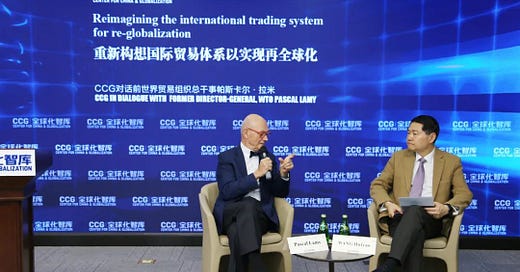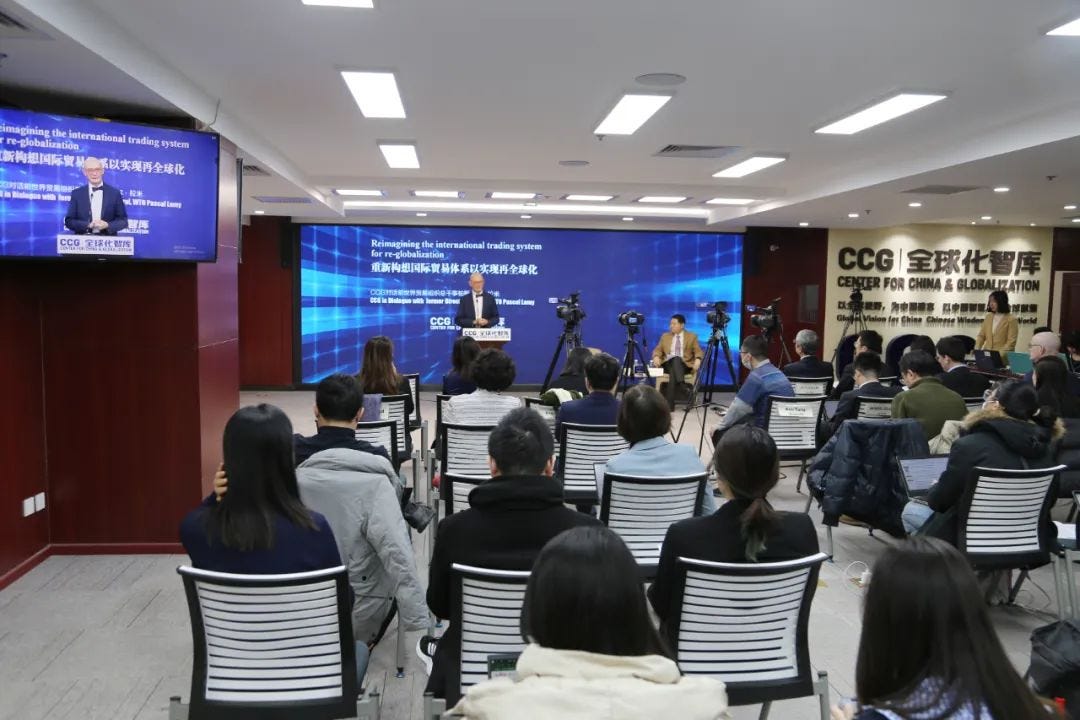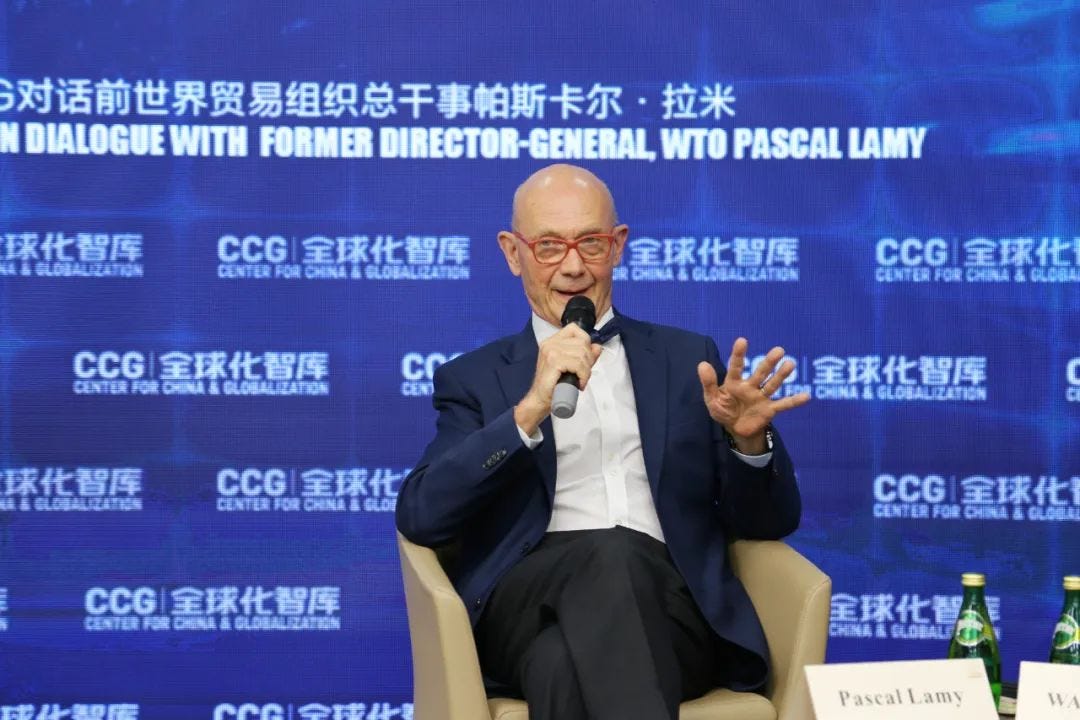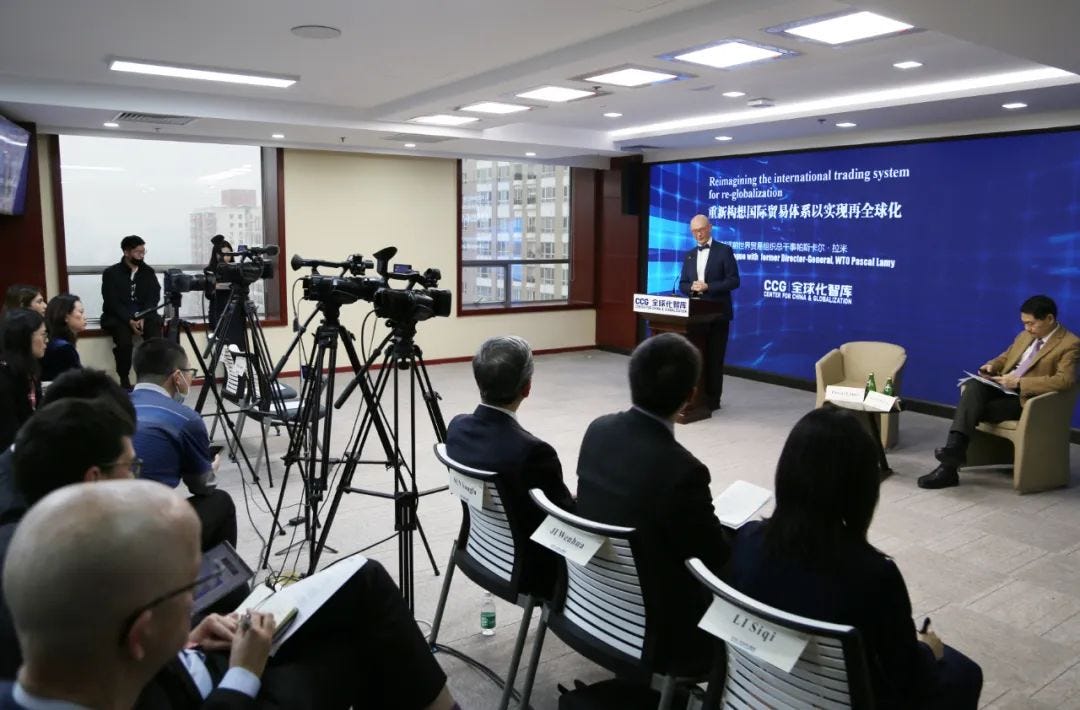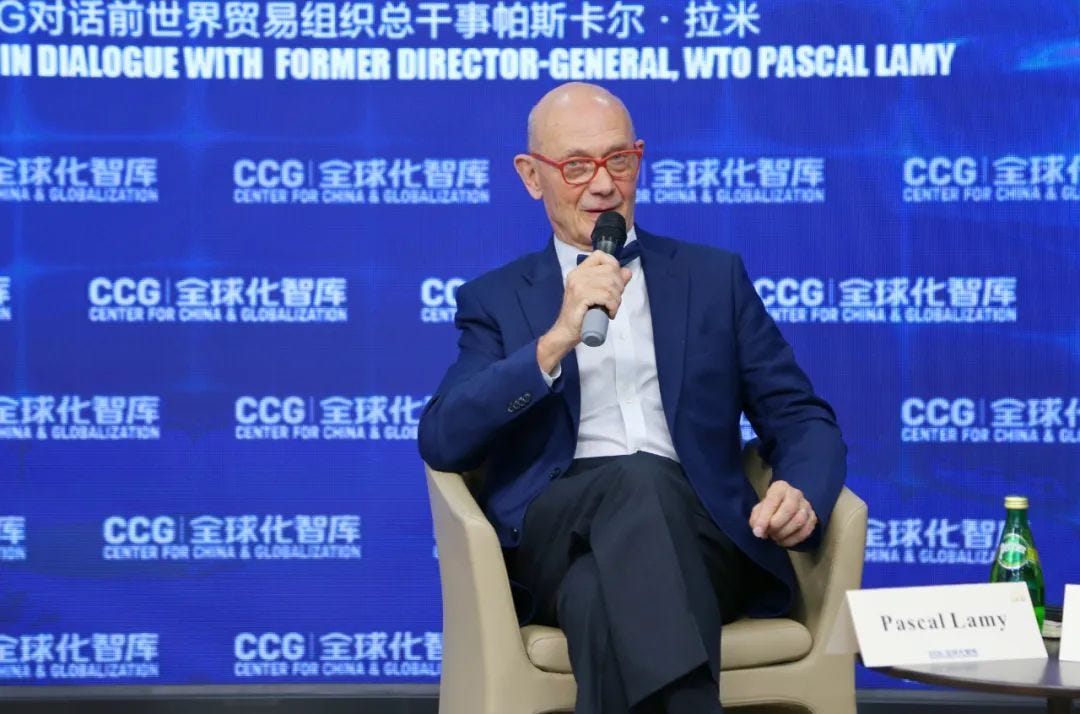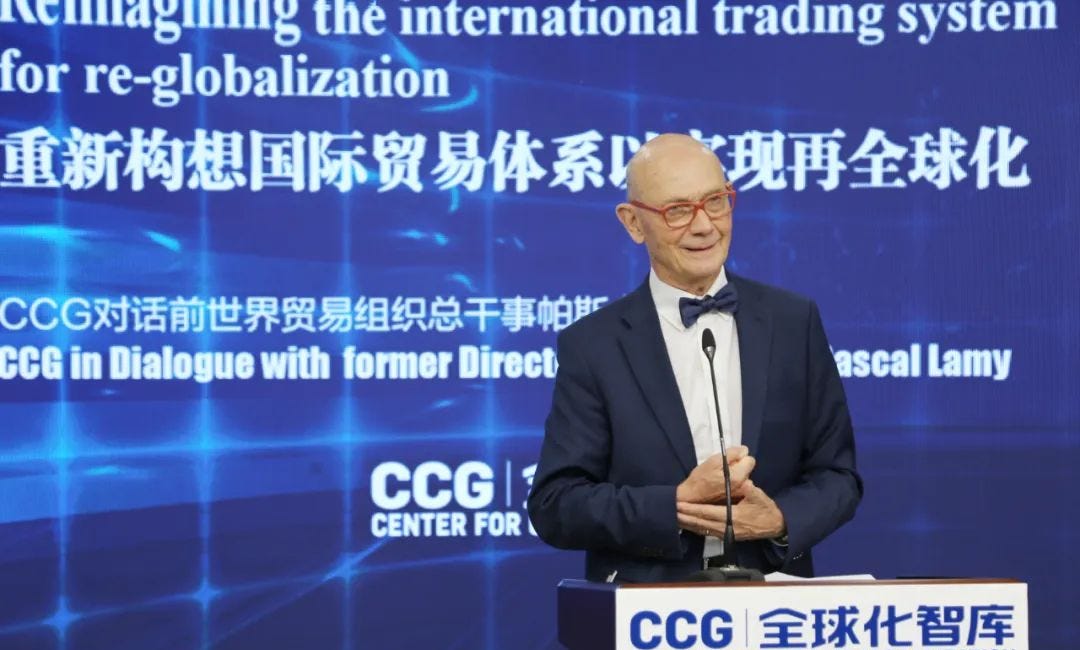Part II: Dialogue of Pascal Lamy with Henry Huiyao Wang at CCG
The former Director-General of WTO emphasized climate issues as paramount, addressed dispute settlement challenges, and highlighted the rising problem of subsidization.
Hi, this is Jia Yuxuan from Beijing, pleased to present you with Part II of the transcript of the Dec. 13 event at Center for China and Globalization (CCG), following Pascal Lamy's keynote speech on the international trading system in a deglobalizing world.
The visiting former Director-General of WTO, after delivering his speech, engaged in a dialogue with Henry Huiyao Wang, President of CCG.
The video of the entire event has been published on the Chinese internet via CCG's official WeChat account and YouTube channel. CCG also broadcast the speech via a range of social media channels, including Baidu, Bilibli, Douyin, Guancha.cn, Kuaishou, and Weibo.
The third and final part of the transcript, where Mr. Lamy interacted with three Chinese scholars, will be issued in the next newsletter.
Lamy identified environment, climate change, and biodiversity as the most critical global challenges. He believes these issues are a life-or-death matter for the planet, surpassing even social justice in urgency.
Lamy also addressed the issue of the digital divide, which he attributed to ideological fragmentation in the digital world. This fragmentation, according to Lamy, is a natural result of differing philosophical, political, and moral views on data governance.
Lamy emphasized that the WTO's role in this context is not about creating a level playing field, but rather about preventing a de-level playing field, which would lead to excessive costs. It was essential to ensure interoperability among major players like the EU, the U.S., China, and India, he said.
Reflecting on personal experiences, Lamy highlighted that the paralysis of WTO's dispute settlement mechanism under U.S. intervention stems from the U.S.'s interpretation of the binding nature of the WTO's dispute settlement mechanism, which has been a point of contention since the U.S. Congress ratified the Marrakesh agreement to join the WTO.
Lamy critiqued the notion that the WTO is solely member-driven and urged for a better balance of authority between the Secretariat, the DG, and member states. Currently, any serious decision within the WTO has to go through the consensus of the members, and that the DG or the Secretariat has zero authority to table a proposal to fix a trade problem. In his view, the expertise of the WTO's Secretariat and DG is underutilized.
Furthermore, he noted that the issue of subsidization has become a bigger problem, as not only China, but also the U.S., is now heavily subsidizing, posing significant challenges for poorer developing countries.
Huiyao Wang:
Thank you, Pascal, for your excellent speech. You have really highlighted the many key issues and challenges and of course, opportunities that we have to work together.
Of course, we know that economic organization has really faced strong headwinds in recent years, marked by challenges ranging from rapid technology change which you mentioned, to increasing extreme climate events (we see the COP28 just happening), and of course also the supply chain issue—There is a widening inequality in different parts of the world. And of course, the WTO has come under strain in many aspects.
You are a global governance reform champion and I know you have led many groups for that. You said you just came back from COP28 in Dubai, and I understand you chair the Climate Overshoot Commission which is a very interesting initiative. I've done a lot of research and you have proposed the CARE reaction, which is to cut emissions, adapt the lifestyles, remove the carbon, and, of course, explore [geoengineering].
Perhaps given you have just come back from COP28, and this trade and climate and were closely related, you can elaborate a bit on your vision of the climate change challenges and give us some updates on that.
What's your takeaway from COP28?
Pascal Lamy:
Well, I believe environment, climate change, and biodiversity degradation are our No.1 problem.
When I was 40 years old, I thought social justice was our No.1 problem. And I'm not saying it's not a problem, but I think now collectively, this is a life-or-death issue for this planet. So it's our No.1 problem.
Biodiversity is a big problem, but science is more divided on biodiversity, notably because bio systems have an inbuilt capacity to morph or regenerate which physical systems do not have.
So climate change is the problem No.1 and we need to ramp up our game because we are late.
The name of the commission [Climate Overshoot Commission], the Paris Peace Forum created, and I had the privilege to chair with a lot of old monkeys and luminaries of my kind. And I selected a commission with a majority of people coming from the South. It's the first time ever that a global body looking at climate issues was composed of the majority of people coming from the South. And I can tell you it changes a lot of the discussion and vision. We did it because we believe the risks of overshooting 1.5 are now extremely high. By the way, science tells us that we will overshoot 1.5.
The open question is: for how long will we do it? Do we still have the capacity to decrease this 1.5 augmentation of temperature once we've done it? And this is the open question. The open question now is not whether we will overshoot or not. It's for how long will we overshoot and are we able to regain the necessary trajectory?
The conclusion of these two years of deliberations is that we have to look at all the options, that you mentioned: cut the emissions, adaptation, removing carbon, and explore geoengineering, which is a very controversial topic—I will be dealing with that later tonight with Xue Lan, who is a very famous Chinese professor and who was a member of the Climate Overshoot Commission—including exploring geoengineering in case. And what we recommend is that these options be considered together with the trade-offs they may imply.
And this, of course, is quite a bold proposal. We propose that the North phases out fossil fuels. This is a discussion in Dubai and, you know, at that time they might have found a compromise [but they didn’t]. We propose things like payback obligations, for instance, which is a big innovation in the way we would handle climate change so that not just cutting emissions but also removing carbon. We propose to explore geoengineering technology, including solar radiation modification (SRM) with a moratorium for risky experiments because some of these experiments may be very risky.
The trade side of the report is minimal. I did not want to bother my colleagues with my trade issues, although we proposed to create within the WTO, what I mentioned briefly a moment ago, which is a comparability forum where countries have different trajectories, different policies, and different ways to use it, there is some sort of coherence within the way countries address their decarbonization trajectory, which for the moment is not the case.
I think and I believe that WTO should be more affirmative. We all know there are members of the WTO, and that the DG is not running the shop, only partially in some circumstances with some parameters. But I personally believe that developing countries are wrong to resist a discussion on this in WTO, as I believe developed countries are wrong to resist a discussion on this at Paris Agreement COP. I think this is stupid.
The problem is there. And if you refuse to address it for matters of principle in one organization and the others refuse to address it in another organization, it’s typical diplomatic blockage, which makes absolutely no sense.
So the first thing to do, as a concrete answer to your question, Henry, is: let's discuss this issue around the table, both in WTO, which is a trade-related organization and in COP, which is an environmental-related organization.
Huiyao Wang:
Great. That's a good explanation. I think you're absolutely right. I think we need to find a compromise and find a solution to address this issue, which is very urgent in the world agenda. Of course, France was the place where Paris Agreement was reached almost a decade ago, so that's really important that we continue that.
I know you have also, not only on the climate, you've been really also championing on the digital. We were on this digital steering committee of the digital global governance.
Then Europe and the U.S. and China all have some different standards. Now we know that the digital world is already a reality and that's something WTO wasn't addressing enough in the past. So how do you see this conversion of the digital world? That's the driving force of the global economy, and China has become the second largest digital economy with 1 billion smartphone users and 70% of the 5G system in the world.
How do you see the digital world come along and become really not divided, particularly on standards, on governance, you have done a lot of work on that. Maybe you can share a bit of that as well?
Pascal Lamy:
I believe a digital world would be ideologically fragmented, whereas the anatomical world would be much more flat. A bicycle is a bicycle everywhere on this planet; a shirt is a shirt; a shoe is a shoe; and a cow is a cow. There is no ideological big difference.
Data are an issue which people see very differently depending on their philosophical or political or moral positions. You don't have what intellectuals call cognitive dissonances about cars or shoes, but you have cognitive differences between countries and civilizations on data., which is why we have, for the moment, a Chinese system, a U.S. system, and an EU system. And the differences of the systems stem from philosophical differences. We all have good reasons to stick to the values which we believe in and in which we have been educated and shaped.
Now, there is one big question mark in this triangle, which is: where will India go?
India is potentially a major digital power. Whether India will go Chinese, I doubt it. Whether India will go Chinese, maybe. Or EU, maybe. Or India—after all, they may all have their domestic market that allows economy of scale and that would make sense.
That’s the difference between the previous world: inevitably, the regulation of the use of data, privacy, storage, accessibility, transport, control—this is different. There will be only limited convergence.
There is convergence. If you look at the way China regulates platforms to avoid excessive market power, we do it exactly the same way in Europe, for exactly the same reasons. Our digital competition attitude is very similar. It is different in the U.S. for the moment, but as you know, it’s changing.
So it doesn't mean a sort of cluster. In some areas, we will have at least compatible, if not similar, attitudes. In other areas, we have to forget convergence and organize coexistence. In the digital world, coexistence means interoperability, technically. This is true both for software and hardware.
And this is where the WTO comes in. WTO is one of the levers. We will not level the playing field, but we will avoid [a] de-level playing field for the reasons I repeatedly gave—to have too many cost consequences. Inevitably, a divided system in a global market capitalist system, whether you like it or not, is more costly than a level system because of simple reasoning on economies of scale.
The WTO is not the only international organization that can try to make the system interoperable. The ITU has a role to play. I think, by the way, organizations like the Paris Peace Forum, where you have not only sovereigns but also big multinational companies, NGOs, major academic institutions, and think tanks, can also help move this in a compatible direction. But the WTO should intervene, where there is necessary space for facilitation, compatibility, and interoperability. This should be the focus.
I don't think the WTO should tell the EU, China, or the U.S. how they should regulate. This is an issue for them to decide. But adjusting the interstices is where the WTO should step in.
Huiyao Wang:
That's a very good insider’s view. The Paris Peace Forum has done quite a lot in terms of bringing all the players together. You have proposed many good suggestions in terms of how to coexist the different systems where WTO can play a very important role.
Just to change a little bit the direction of our conversation. I noticed that the EU has recently had some new standards and a new agreement on AI. So what do you think about AI now? It's become the topic of the summit between President Xi and President Biden in San Francisco. Graham Allison sent me an article he authored with Henry Kissinger, the last piece of Dr. Kissinger, on this AI threat, a possible side effect of which is that human beings may not be able to control it.
What do you think about that and how China, the U.S., the EU can work together on this AI future, whether we can harness it or whether we could be controlled by it? What's the way to get into that?
Pascal Lamy:
I'm an optimistic, which does not make my life easy in present times.
I believe AI offers huge opportunities in areas like science, medicine, for instance. I also believe AI entails risks, notably because the more these algorithms become sophisticated, and they become more and more sophisticated as they learn, and I'm talking about the part of AI which is about machine learning, there is a risk, and these risks need to be regulated by the sovereign.
I'm not saying they should be regulated forever. Things are changing incredibly rapidly, and I know of people who say it's absolutely stupid to regulate today a world that's going to be totally different five years from now.
I don't buy this argument. I think we can polarize by quarrels and errors. And I think that the public needs to believe that AI is something which is governed, harnessed, in a way that it will not turn against humans or normal political public goods.
So, we need to regulate it, and we do it in different ways.
Now, We all do it. China does it, the U.S. did it with a executive order recently, which is of good quality. The Chinese system is quite sophisticated and very advanced, and the EU just agreed on the legislative package last week in Brussels, which is in a way more precautionary than the U.S. or China. But this is our culture for many reasons. The Europeans have a culture that is more inclined to precaution and less to risk. There are good sides to that, and bad sides to that, by the way.
So, the question comes back to: what do we do with different regulations?
The good thing is that we all in common believe that they are risks. And the nature of the risks, which the Chinese regulation or the EU regulation or the U.S. regulation is meant to address, is quite similar.
What differs is the spectrum of what is very risky and what is not risky. We all recognize that we need to regulate because of risk, but we don't have [consensus on the spectrum]. And that's natural. Risk is a scale between good and bad. Whether something is more risky or not is whether it's worse or better. And good and bad is something that is fundamentally moral or philosophical. It's not a machine that will tell you whether it's good or bad.
So, that's the issue. And then we have to try and make sure that, again, regulating AI does not fragment too much our digital world. For the moment, there are elements of fragmentation. There is a G7 working group and China has launched its own forum to discuss that. And the UK just invented one. The G20 will probably do it at some stage. And it's, in a way, a bit inevitable.
But long term, again, we need more convergence on this. And by the way, I had a long discussion with the UNSG in September when I gave him the Climate Overshoot Commission report. And he is of the view that the UN should create enough muscle expected to have a body that is overseeing the way AI is regulated. And I agree with that. It's something which, again, we will have in common. We have our differences in the way we handle this. But we need an overarching system that limits divergences and that at least organizes co-existence.
And by the way, the Centre on Regulation in Europe (CERRE), which produced the first report about global digital ecosystems at the Paris Peace Forum in 2022, is now working on a new version, this time with separate briefs. The first of which appeared 10 days ago in Brussels before the legislation was adopted.
Huiyao Wang:
Great. You have given us a lot of food for thought. I think the EU has already started legislative work on that. And also we'll see how we can really get those different major economies working together and some convergence with possibly WTO.
So before I open for our discussants and of course, our media friends, my final question is that I cannot let you go without asking a question about WTO. You are one of the key architects of global governance in many ways, like climate and digital and AI. But what about the WTO?
We have the 13th Ministerial Conference coming up in Dubai early next year. And WTO seems to be the driving force, a very important driving force of globalization. And China probably is the largest beneficiary of the WTO and of course, many other countries are.
So now WTO has many challenges. Its Appellate Body has been basically paralyzed to some extent, and it's difficult to reach new consensus, even though we did something on fisheries and trade liberalization.
But what do you see the WTO ahead and what can we, China, the EU and the U.S., and the Secretariat of the WTO, do? And how can we really enhance the WTO? I think in the end, people have to come back to the reality. We have so many different divisions, and so many new things coming up. We don't have a strong organization like WTO, which in the past 70 some years has greatly changed the world. And so we still have to work together. And you have been eight years as a DG of the WTO. What's your vision and reform advice for WTO and how we can, China, U.S., the EU and you can work together as the three largest economies in the world?
Pascal Lamy:
So, rapidly, we have three problems.
The first one is credibility, because of the way the dispute settlement system has been paralyzed by the U.S. This stems from a wrong interpretation, in my view, of the WTO statute. It was interpreted in a way that the nomination of judges to their appellate body needs to be done by consensus. This is not what the charter of WTO says, but for a variety of reasons, it was accepted that they should interpret it this way and nobody else made enough of the case that that was not the right interpretation of the WTO statute.
This is a procedural matter. Nominating seven judges in a body is not something for a consensus or unanimity. But let me put that aside. So we have a problem in that, for the moment, the enforcement mechanism, which is the distinctive feature of the WTO, is paralyzed. This needs to be fixed. And it's going to be fixed in two possible scenarios: either the U.S. re-accept what they have accepted in signing the WTO agreement in 1994, that the dispute settlement is binding on the members. A losing party has to comply, otherwise, there will be measures. This is what the U.S. signed in 1994.
Do they still stand to this commitment? Yes or no? If yes, you lock ten WTO negotiators in a room during two days and you tell them they will only go out when they have an agreement and they will have an agreement. It's perfectly doable. The issues at stake are perfectly negotiable. If the U.S. do not accept to go back to their commitment, then we are in a totally different world. We will need a binding dispute settlement with all the members of the U.S. This will mean de facto that the U.S. are stepping out of WTO.
This is problem number one.
Problem number two is the way the WTO works and the balance between the authority of the Secretariat and the DG and the authority of the members. This notion that the WTO is a member-driven organization does not make sense. Of course, it's driven by its members like any international organization. It's created and agreed and framed by the members. But that any sort of decision that is a serious one has to go through the consensus of the members, and that the DG or the Secretariat has zero authority to table a proposal to fix a trade problem that exists, that has been identified—These people are incredibly good experts. They know the countries, they know their position, they know the problems—exiting them from the negotiating system is an absurdity. You lose an enormous capacity to do things properly, quickly, scientifically, expertly, and politically. It's stupid.
And this rebalancing is not in the cards. And the reason why it's not in the cards is that the members want to stick to the notion that they decide everything. I often quoted an anecdote, which is that when I became DG of WTO, I was given by a former DG who was an Australian [sic], a very witty guy and very good caricaturist. I was given a cartoon with a tree, very nice tree, well-drawn with a nice big trunk, nice leaves, and a car had crashed into the street. The car is all over the place, totally broken. The legend of the cartoon is “member-driven car.” I had this cartoon in my office in the WTO.
So this is a bad system. It needs to be fixed and rebalanced if you want the WTO to work like a normal organization where there is a division between political authority and technical proposal. But this really needs to be fixed.
Third, we need the WTO to address the few issues which I mentioned, like trade and environment, like digitalization, like economic security, like subsidization which has been there for a long time but which is now a bigger problem than before because before, only China was heavily subsidized. Now the US is subsidizing as much as China. So it becomes an enormous problem for many poorer developing countries. In a subsidy war, they will be the losers.
So these issues need to be addressed. And if you tick these three boxes, you will go back to the normal situation where global market capitalism needs a properly regulated multilateral trade system with obstacles to trade that appear being addressed and reduced in a negotiated, fair way.
Again, the third and final part of the transcript, where Mr. Lamy interacted with three Chinese scholars, will be issued in the next newsletter.

